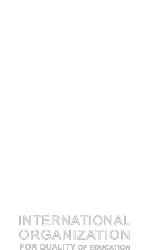IOQE’s Criterion for Accreditation
IOQE lays down criteria for educational institutions established all around the world. Institutions need to implement and acquire standards of quality, successful application of which will provide accreditation license.

Criterion II: Integrity
The institution operates with integrity to ensure the fulfillment of its mission through structures and processes that involve the board, administration, faculty, staff, and students.
- The institution’s governance and administrative structures promote effective leadership and support collaborative processes that enable the institution to fulfill its mission.
- The institution upholds and protects its integrity.
Criterion IV: Application of Knowledge
The institution promotes a life of learning for its faculty, administration, staff, and students by fostering and supporting inquiry, creativity, practice, and social responsibility in ways consistent with its mission.
- The institution demonstrates, through the actions of its board, administrators, students, faculty, and staff, that it values a life of learning.
- The institution demonstrates that the acquisition of a breadth of knowledge and skills and the exercise of intellectual inquiry are integral to its educational programs.
- The institution assesses the usefulness of its curricula to students who will live and work in a global, diverse, and technological society.
- The institution provides support to ensure that faculty, students, and staff acquire, discover, and apply knowledge responsibly.
Criterion I: Mission
The institution’s mission and standard of education followed by it must be clear and understood by the public at large. The nature and scope of the institution must be articulated publicly. The institution’s emphasis on research, scholarship, instruction, academic programs must be known to the public in detail.
- The institution has a widely published mission statement that articulates a purpose appropriate for an institution of higher learning, gives direction for its efforts, and derives from, and is generally understood by, its community.
- The institution defines mission fulfillment in the context of its purpose and expectations. Guided by that definition, it articulates institutional accomplishments that represent an acceptable threshold or extent of mission fulfillment.
Criterion III: Student Learning and Effective Teaching
The institution provides evidence of student learning and teaching effectiveness that demonstrates it is fulfilling its educational mission.
- The institution’s goals for student learning outcomes are clearly stated for each educational program and make effective assessment possible.
- The institution values and supports effective teaching.
- The institution creates effective learning environments.
- The institution’s learning resources support student learning and effective teaching.
Criterion V- Resources, Planning, and Institutional Effectiveness
The institution’s resources, structures, and processes are sufficient to fulfill its mission, improve the quality of its educational offerings, and respond to future challenges and opportunities. The institution plans for the future.
- The institution realistically prepares for a future shaped by multiple societal and economic trends.
- The institution’s resource base supports its educational programs and its plans for maintaining and strengthening their quality in the future.
- The institution’s ongoing evaluation and assessment processes provide reliable evidence of institutional effectiveness that clearly informs strategies for continuous improvement.
- All levels of planning align with the institution’s mission, thereby enhancing its capacity to fulfill that mission.

Accreditation for Universities
IOQE helps ensure universities impart an international standard of education that runs parallel to its QA model.

Accreditation for Institutes
IOQE acknowledges the importance of the student enrollment rate for an institution. Getting status of accreditation from IOQE will help the institutes to establish their credibility in the world of education.

Collaboration & Networking Opportunity
IOQE through its wide network of member institutions around the world facilitates collaborations and partnerships among its accredited academic institutions.


